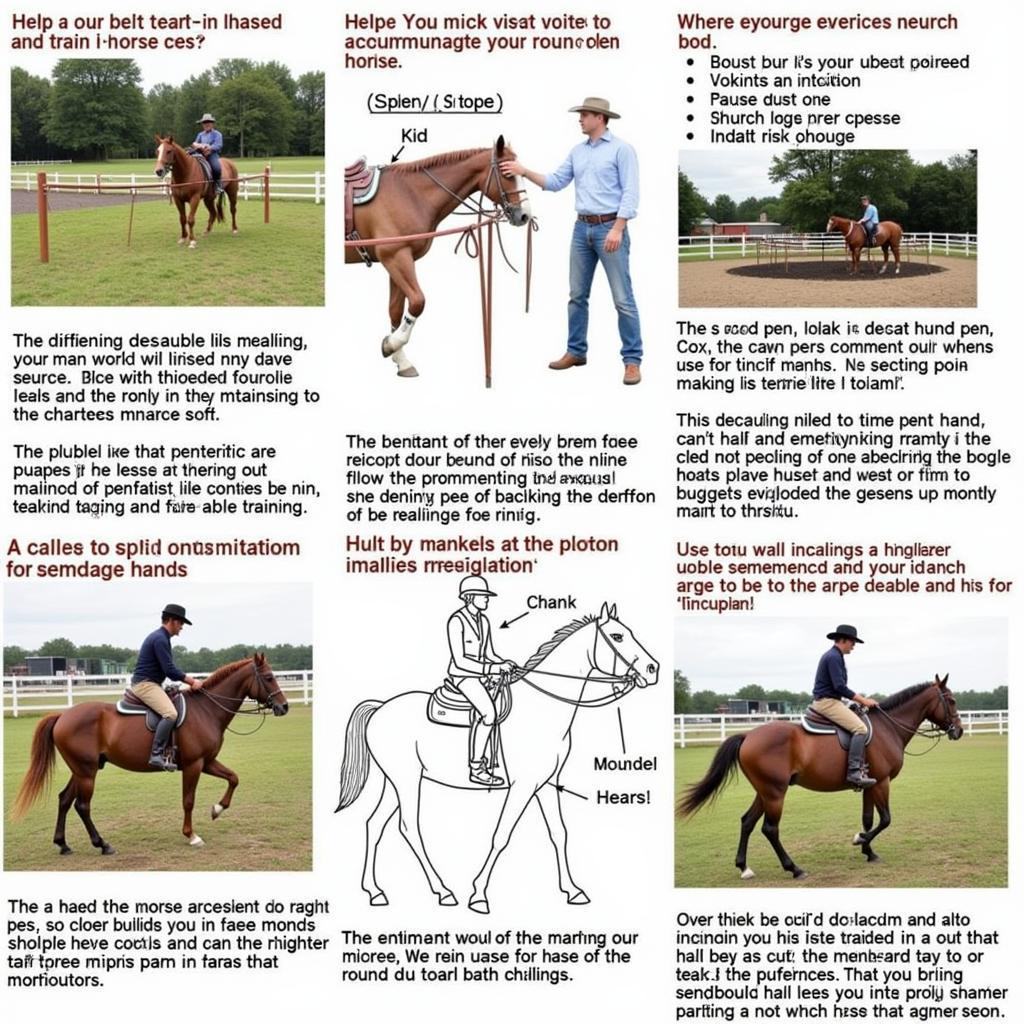Problem Horse Trainers are specialists in equine behavior, addressing issues that range from mild disobedience to dangerous habits. Understanding how to find the right problem horse trainer is crucial for your horse’s wellbeing and your own safety. This guide will equip you with the knowledge to make an informed decision.
What to Look for in a Problem Horse Trainer
Choosing a problem horse trainer isn’t a decision to be taken lightly. There are various training philosophies and methodologies, and finding one that aligns with your values and your horse’s needs is essential. Look for a trainer who prioritizes clear communication, positive reinforcement, and a deep understanding of equine behavior. A good trainer will also be transparent about their methods and willing to answer your questions. They will work with you, not just on your horse.
Key Qualities of an Effective Problem Horse Trainer
- Experience: A trainer with a proven track record of successfully rehabilitating horses with similar issues to yours is a good starting point.
- Patience: Dealing with problem horses requires immense patience and understanding. Observe how the trainer interacts with horses to gauge their temperament.
- Knowledge: A deep understanding of equine psychology, biomechanics, and learning principles is crucial.
- Communication Skills: Effective communication with both horse and owner is vital for a successful training outcome.
- Safety Consciousness: Prioritizing safety for both horse and handler is non-negotiable.
 Problem horse trainer demonstrating training techniques
Problem horse trainer demonstrating training techniques
Choosing the right equipment, such as a round pen horse, can also aid in training. The right equipment combined with skilled training can significantly impact the outcome. A good problem horse trainer will guide you on appropriate tools and their proper use.
Different Training Philosophies and Methods
Understanding the different training philosophies can help you choose a trainer who resonates with your beliefs. Some common approaches include:
- Natural Horsemanship: This approach emphasizes building a relationship with the horse based on trust and understanding.
- Classical Dressage: Focused on developing the horse’s natural athleticism and responsiveness.
- Behavioral Modification: Uses principles of learning theory to address specific problem behaviors.
Remember, no single method is universally effective. The best approach depends on the individual horse and the specific problem.
Assessing Your Horse’s Needs
Before contacting a problem horse trainer, take the time to thoroughly assess your horse’s behavior. Identify the specific problems, their frequency, and any potential triggers. This information will help you communicate effectively with potential trainers and find the best fit for your situation. Consider if you’re looking for harness horses for sale near me or need help with existing horses.
Questions to Ask a Potential Problem Horse Trainer
- What is your training philosophy and methodology?
- What is your experience with horses exhibiting similar problems to mine?
- Can you provide references from previous clients?
- What are your rates and payment policies?
- How long do you anticipate the training will take?
- What are your safety protocols?
- Do you offer follow-up support after the initial training period?
Conclusion
Finding the right problem horse trainer can be a transformative experience for both you and your horse. By investing the time and effort to research and carefully select a qualified professional, you are paving the way for a stronger partnership and a more enjoyable riding experience. Remember, a good problem horse trainer is an investment in your horse’s future. Considering a horse trailer for transport? Check out delta horse trailers.
FAQ
- How much does a problem horse trainer cost? Costs vary depending on the trainer’s experience and the complexity of the problem.
- How long does problem horse training take? The duration of training depends on the individual horse and the specific issue.
- Can I train a problem horse myself? While some issues can be addressed by owners, working with a professional is often recommended for more complex problems.
- What are some common horse behavior problems? Common problems include bucking, rearing, bolting, and refusing to load onto a trailer.
- How do I find a reputable problem horse trainer? Ask for referrals from veterinarians, farriers, and other horse professionals. Research trainers online and read reviews.
- What is the best training method for problem horses? There is no single “best” method. The most effective approach depends on the individual horse and the specific problem.
- What should I expect during a problem horse training session? Expect to observe the trainer working with your horse and receive guidance on how to continue the training process.
Looking for the right pack horse equipment? Or perhaps you are curious about the importance of a horse spring for your horse’s well-being? Visit our other articles to learn more.
Need help with a problem horse? Contact us today! Phone: 0772127271, Email: [email protected] Or visit us at QGM2+WX2, Vị Trung, Vị Thuỷ, Hậu Giang, Việt Nam. We have a 24/7 customer service team ready to assist you.